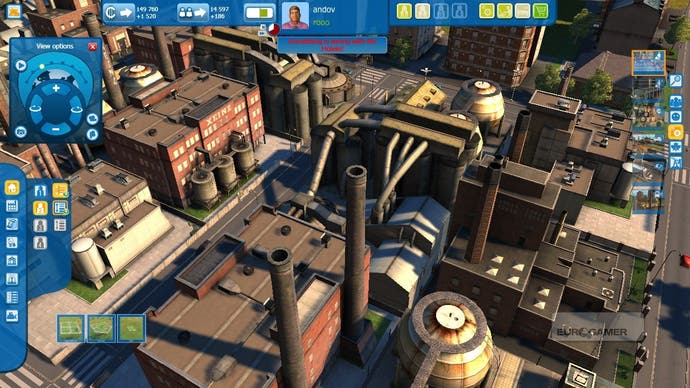Cities XL
Trade and industry.
What the utilities in Cities XL seem to lack is any capacity for you to control how much money they spend. A small hospital, for example, tops out at a cost of 5000 a month, and it will just do that when the population it serves is at the right level. Nothing you can do about it. Other games have employed spend sliders and such, allowing you to moderate your expenditure a little more subtly. As it stands in Cities XL, you find yourself deleting very expensive constructs because they end up costing too much. That doesn't make for smooth play.
What's odd, too, is that there's no real facility for infrastructure outside of road-building and zoning. Although you do have to provide fuel, water and electricity later on, these are simply facilities that you can build anywhere in a city. As long as they're on the road grid, everything works. I find myself pining for the water-flow grids of SimCity 2000, or the need to connect up the power. Nevertheless, if you can ignore the logical and infrastructural quirks of Cities XL, this is a competent and occasionally spectacular city-building sandbox. You can evolve some incredible cityscapes in it - and that's something few of us outside of Dubai's oil barons will ever get to play with.
Then there's the matter of the online game. When you get to the planet mode - which is an additional expense to play, after the first free week - you can select from a number of planets and then find a spot to build your business. There's a consideration here that is missing from most city games, which is the resources you have in your slice of the world. This might be water, fuel, fertile land, or holiday locales, or a combination of these. Any resource type can end up being something you'll use to gain traction in the multiplayer game, which is a trading, player-driven economy.
Find yourself with a shortfall in electricity, or office space? Well, you can simply buy what's on the market. You can even enter into specific contracts with your fellow players, so that if he's producing lots of X, and needs your surplus of Y, you can help each other out over the long term. I tried that with a friend, but it took us a long time to even set up contracts, let alone make any difference to each others' cities.

None of this is helped by the laggy, clunky and buggy trade interface. This kind of unfinished edge ultimately feels representative of the game as a whole. Online conceits - like being able to visit each other's cities with your mayoral avatar - really don't seem to add anything to the game, despite being able to dance like a chicken in the middle of the street. Right now that economic game isn't interesting, complex, or coherent enough to be anything other than an eccentric sideline to the (fairly demanding) business of keeping your city afloat.
Cities XL is, quite explicitly, a work in progress. Developer Monte Cristo promises much more to play with in future, including a train network and other vital elements of urban modernity that do not currently appear in the game. It's also talking about mini-expansions that will create extra management-game layers within your game-world - a ski resort, for example. This is a game with big plans.
But these plans don't really influence what we currently play, which is an engaging, challenging, but fundamentally wonky city-building game that you can, should you wish, take into the theatre of other people. Having that MMO chat-box in the corner of the screen is fun and useful - you get questions quickly answered by the helpful little community that is always online - but right now the further consequences of going online don't seem vital, even to a wizened old internet junkie like me.
I've enjoyed myself here, but Cities XL does not live up to its ambitions. The solo city-builder is a well-paced project for those who like to plot boulevards, but the appeal of the larger game remains unresolved. This is one game we'll be returning to in due course where - all being well - a re-review should cast things in a slightly different light.

